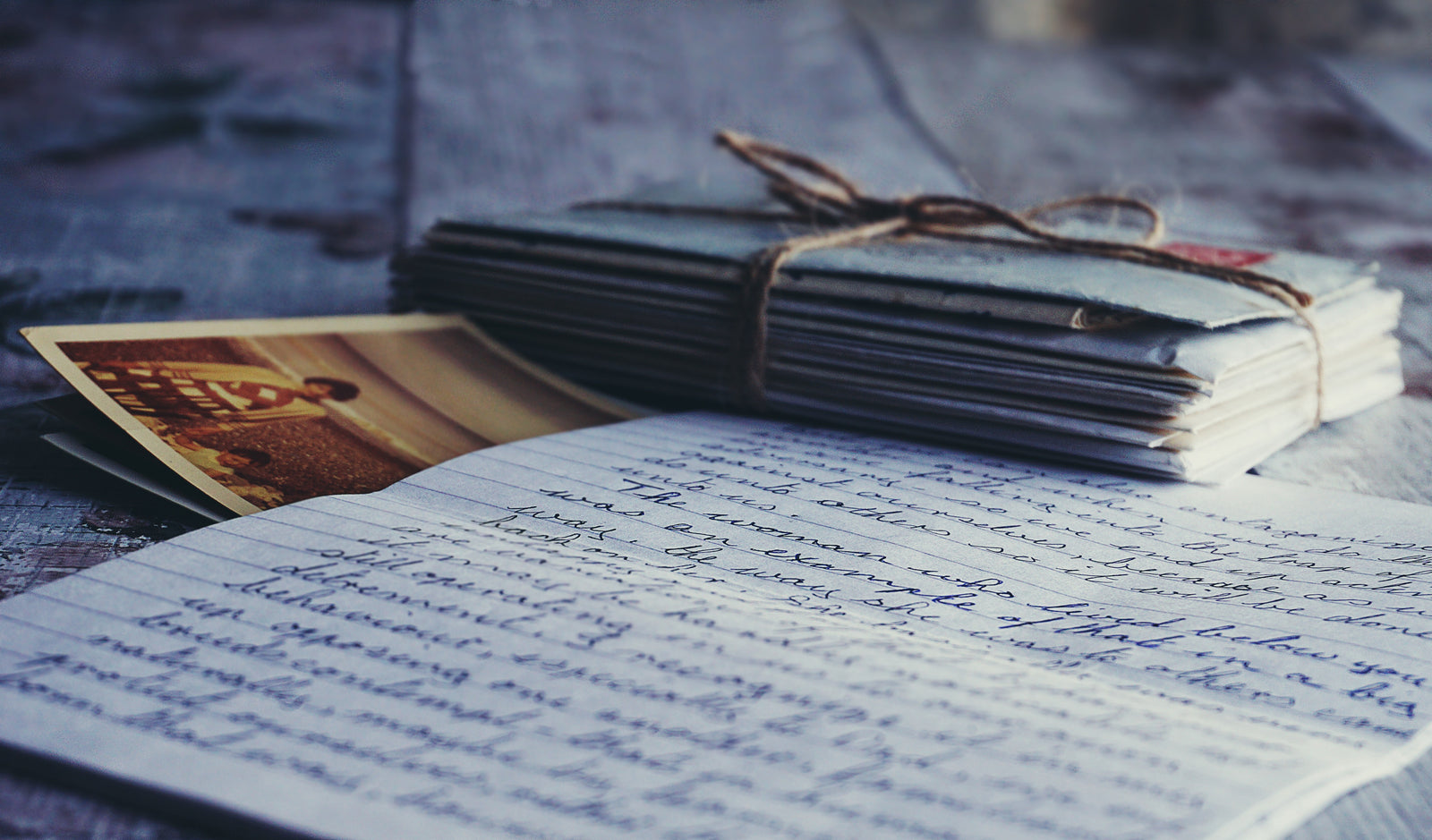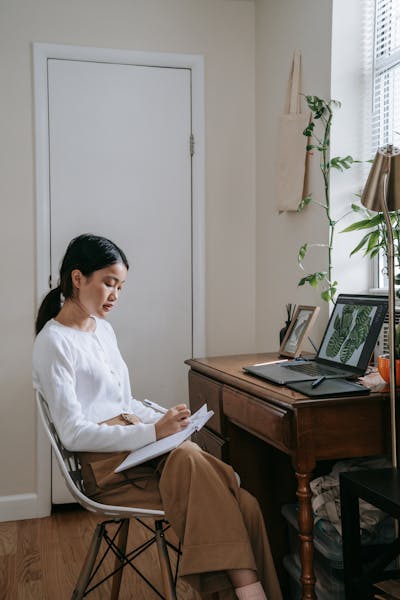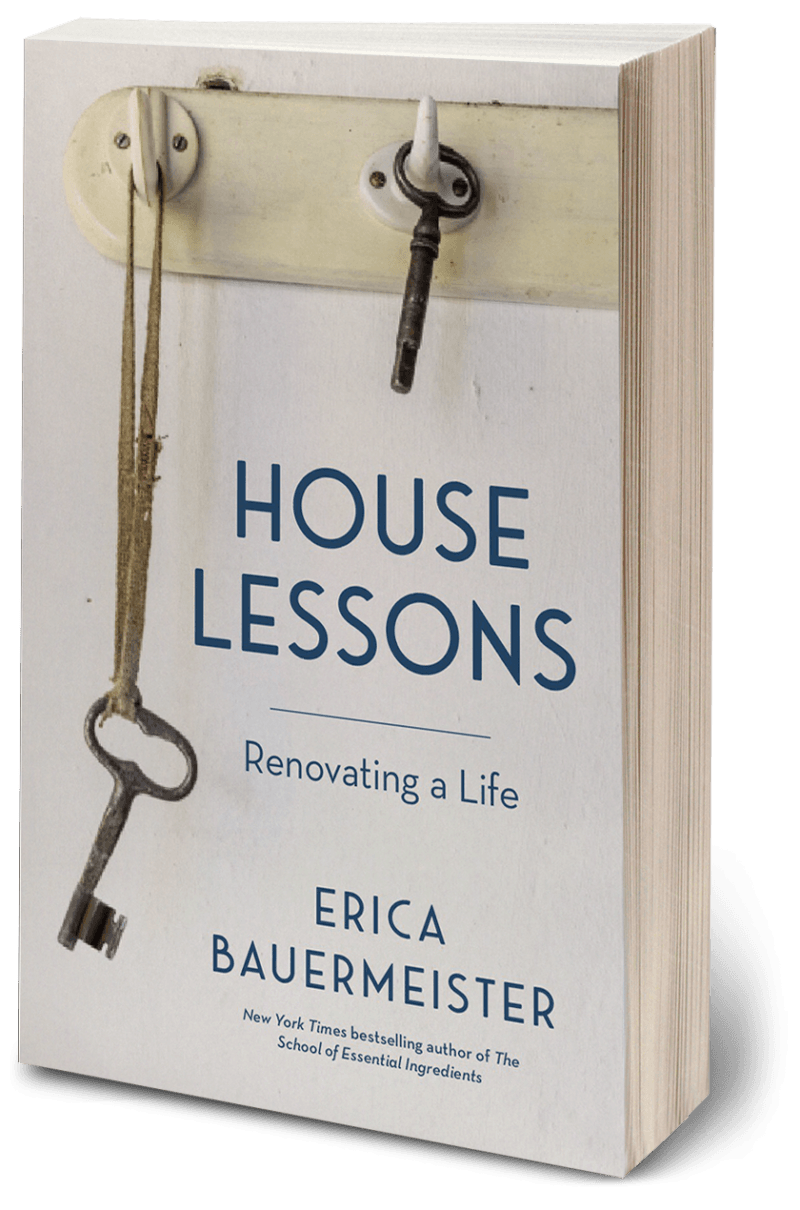Stirring Your Inner Author with Erica Bauermeister

We spent a lovely afternoon in conversation with upcoming guest teacher and author Erica Bauermeister. We discussed her upcoming retreat details, Erica's writing process, and the inspiration behind her novels. The workshop, called "Jumpstart Your Memoir," is for individuals with or without a written memoir, but for everyone looking to embrace their inner identity as a writer.
Watch the full interview on Instagram.
Hunter Moon Homestead Are you in your writing room?
Erica Actually, this is my business room. I have a business room and I have a writing room. They're two very different things.

We're so thrilled to be having you on the Homestead. You will be our first writing retreat. I'm really curious about your writing process and how it's changed over time. I know you've written several books. Can you talk about that?
I started writing back in college. I tried getting published for a really long time. I wrote guides to books, and then tried publishing a couple of different memoirs, none of which were published. Then I switched to fiction. The reason why the memoirs weren't getting published is the publishers kept saying they weren't personal enough. Then I started writing fiction and everybody wrote me and said 'Your fiction is so personal.' I thought that's really interesting, maybe if I lie, it'll be better. What I learned over the years, over the number of novels that I've written, is that fiction was a way for me to take those baby steps into being truly honest, and not worrying about my ego and really compassionately looking back at things that happened in the past.
So that by the time my memoir, House Lessons was published, close to 20 years after the events occurred, I had that distance. I had that compassion. It was all a great way to get to where I thought I was starting.
Exactly. So do you have a regular writing practice? Do you write every day?
I try to. It was actually much easier during the pandemic. It was a very good focusing thing. I have a writing studio that's a little 8' x 8' shack down in our orchard and I go down there in the mornings. Winter is my favorite time because I go down in the dark and I write my way into the light.
What inspires your writing?
Oftentimes an idea for a book will just sort of come into my head. My first novel was about a cooking school with eight students and their teacher. I just knew the structure [I wanted]. For House Lessons, I knew that I had these stories, but I'd been studying perfume... So, this feels like a weird digression, but this is how it works in writing, and I had learned in perfume that there, top notes, middle notes and base notes, right?
It's the same thing, I believe, in memoirs. So the top notes are the events, the things that happened. When I was writing about the events in 2001, when they were actually happening, that's what I had. I had good top notes, right? I had 7.5 tons of trash. What I needed to do in the second draft and the third draft was figure out the middle notes, which is 'what did I learn from that experience?'
What it takes sometimes 15 years to get the perspective on is the base notes. Which are, 'What would anyone learn? What are the universal lessons?' Whether or not you ever renovate a house or hiked the PCT or, you know, study a hawk for a year. We read these books even though we never intend to do those things because these books are also about something else.
They're about grief, they're about family, they're about figuring out, how you put your life together. And once I got that understanding then it worked.
Yeah, it's really beautiful. I love the analogy. I've also studied perfume making, I and I have taught perfume making. I loved your book, the Scent Keeper. I loved it so much. It was really wonderful and I could relate to it so much because I understood that world very intimately. I also make an organic skincare line called Essential Apothecary Alchemist, and essential oils are really integral to the formulations.
I love knowing that because I would really love to add aspects of that into the memoir workshop that I'm doing. One of the things I do is talk about using all of your senses.

Wonderful. Really looking forward to it. Can you tell us about how you teach writing?
I actually got the full PhD in literature. [The university's] goal was for me to become an academic and to get tenure and all that. I found that I didn't like the way I was being told to teach in, in academia. For me writing is about the interaction with the people.
The joy of teaching is being in a room with people and watching their faces. It's an interactive thing. There's this dynamic thing that happens, which is so organic and so wonderful. That is both the form and function. It's lecture and lab. When my students are [interacting] like that, they get more out of the content that we're teaching. They're also learning things about empathy and compassion and listening and responding. There are a lot of essential life skills that go on in a classroom like that. And so for me a workshop is my happy place. I love doing workshops.
Yeah, and we keep them small so we can really focus a lot of attention on individuals and really lavish people in so many ways - using all the senses. That's a big part of the magic here: how things look and feel and smell and all that. There are small groups and people can get really intimate and close and connect with each other.
What would somebody expect to come away with, working with you so intimately in a small group?
One of the fun things is the way that the group can come together, and we can learn from each other. In these small groups you really have the ability to be flexible and to really look at where each person is in the process. So the workshop is called Jump Start Your Memoir. It might be that you have a whole memoir written, but you're stuck on figuring out what's just not quite working for you - The way House Lessons didn't work for me the first couple of times. I needed other people to come in and say, 'What about this and let's try this.' It could [also] be someone who hasn't written a word. The lessons will be the same but how you apply them might be slightly different. I find that really everybody is gonna learn from everybody else and, the different points in the process is part of that.
I love that beginning of a class where we figure out where everybody is. And I always ask everybody, 'What do you want? What do you expect?' And if that means that night I go home and I re-jigger stuff. Fine. That's what I do. It allows me to tailor things much more to the experience.
I'm curious what you would tell to somebody who doesn't consider themselves a writer but is really drawn to writing, that might be intimidated by this kind of practice?
I love that question because I, you know, I spent a long time trying to convince myself and other people that I was a writer. I would always say "I'm a writer, but I'm not really a writer because I write or have been published. I don't do it every day. I have kids like this or that the other thing..."
What I always tell [students who say this] is "OK. Look, I have been a mother for 37 years, right? Have I ever been paid to be a mother? I a mother in my bones." Being a mother is a way of seeing the world. Writing is a way of seeing the world.
[You know] you're a writer if you're the kind of person where you love being in an airport because you look at the people around you and try to figure out what are they thinking. You know, you go for a walk and you see the angle of a house and you think, 'How would I describe that to somebody else?' You know, it's that kind of living in stories and words, whether they're fictional or not. That's what makes you a writer.
I think we do ourselves a great disservice when we negate that in any way, because our lives are so much fuller when we allow ourselves to experience it that way.
I think it really is a very human experience. Like making art; that act of creation. Writing is also part of that. It's an innate part of everyone. You're going to find a way to express yourself, whether or not it's your livelihood.
Right. Lots of times we get frustrated because, we all use words, so, we think we should be able to write immediately. Like Mozart, you know, we're going to put our pen to the paper and a symphony will occur. It's a skill, it's a job, it's a process. It took me 20 years to get published from my own personal work. And that was because I was learning, I was putting in those 10,000 hours.
Now, you could say, "Well, that takes a long time, I don't want to do that." But the reality is that whole time I was learning so much about writing, about myself, about the world. It was not a well paid process. You got to keep your day job. But, it was completely worthwhile. You don't become a writer because you think you're gonna make money.

Are you working on something currently you want to share?
I am. It's pretty early in the process. I can tell you that, the idea came from, you ask where I get my inspiration. I, I'm a very eclectic reader. I'm an eclectic wanderer of bookstores, and wanderer of my neighborhood. I get the Atlas obscura email every morning and there are the weirdest, most quirky and wonderful stories and I read about the difference between mazes and labyrinth and a labyrinth is a single path.
More of the spiritual journey. The, the maze is the puzzle. The getting lost. The challenge. And I thought for two things that can look very similar. They are completely different ways to approach the world and to think. And I'm just curious, what would that be like? What would a person who believes one and the other, how would they approach the world and how would they approach each other?
I mean, that might be, might be rather, you know, a lot of conflict there potentially. So, and I'm always, you know, fiction is about conflict as his memoir for that matter.
For everyone's knowledge, this year we're offering our first artist in residency program and we're happy that Erica has agreed to stay on for the week after the retreat and use our place to help focus some of her writing, which is lovely.
That's something I would say about workshops too because you also do get plenty of time on your own. And, there's a [writer's] retreat that I go to on Whidbey Island called Hedge Brook. That's part of why I was so interested in Hunter Moon Homestead, because there's a similar feel. Where you just go somewhere else for a condensed period of time. I always say I do as much writing in a week at Hedge Brook as I would do in three or four months [in my studio]. I have a feeling it's going to be the same at your place in.
We're so excited to have you. September 12th to the 15th, 2024. We only have a few spots left!
It feels like a long way out, but I know when I have a vacation planned I'll live off the plan and the thought of it as much as I do afterwards It's sort of like there's the beginning and then there's the event itself and then there's the way that it goes home.
In fact, one of the things that I recommend to people, who are thinking about doing a retreat like that is when you pack, you think about things that you don't use otherwise. So a tea, you've never tried, a scent, you've never worn, a sweater that you've never had before. And then you kind of, you use all those things while you're [at the retreat]. Then when you go home and you're kind of forgetting that wonderful writer person you were, then you drink that tea or you smell that smell or you wear that sweater, and you only do it when you're going to create.
It's kind of, it's the same kind of prompt that I get when I go down in my writing studio, because my writing studio is just for [writing], but you don't have to have a whole separate space. You can use your other senses to cue your mind. "I'm gonna be ready to write or create. I'm gonna get rid of the outside world. I'm gonna smell this tea. I'm gonna put on this sweater."
You could just do it by sitting in this specific chair. In this chair, I only write, right? I only create in this chair. Or paint a wall. I've painted a different color, a color that makes me feel creative. And these are all cues. This is all stuff I learned, by the way, when I was researching House Lessons. How we can use architecture and various props to get us to change our behaviors, to be more productive and creative and happy.

I love it. I'm gonna use that one.
It's a fun one. It feels very indulgent, but in fact, it's really productive.




